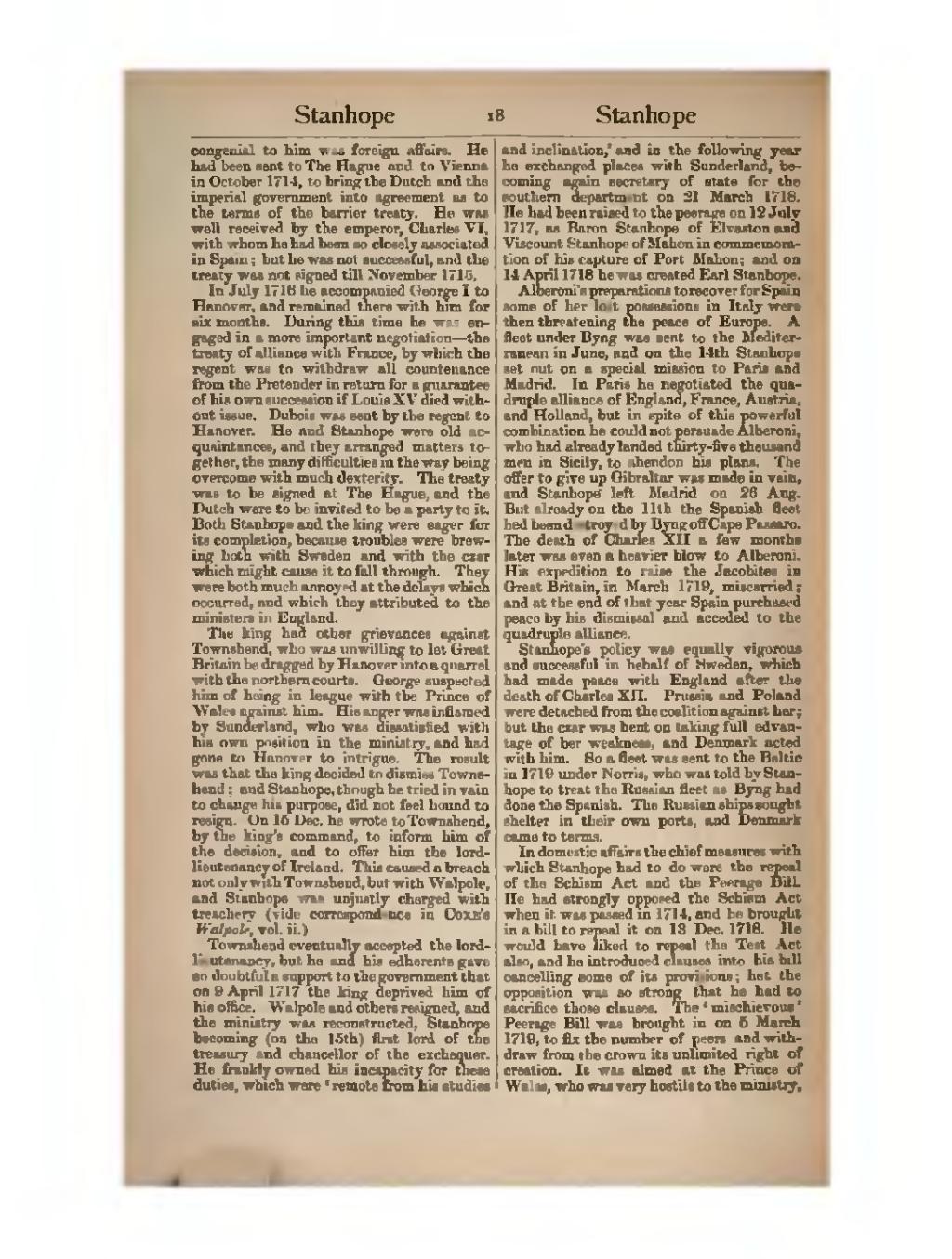congenial to him was foreign affairs. He had been sent to The Hague and to Vienna in October 1714, to bring the Dutch and the imperial government into agreement as to the terms of the barrier treaty. He was well received by the emperor, Charles VI, with whom he had been so closely associated in Spain; but he was not successful, and the treaty was not signed till November 1715.
In July 1716 he accompanied George I to Hanover, and remained there with him for six months. During this time he was engaged in a more important negotiation the treaty of alliance with France, by which the regent was to withdraw all countenance from the Pretender in return for a guarantee of his own succession if Louis XV died without issue. Dubois was sent by the regent to Hanover. He and Stanhope were old acquaintances, and they arranged matters together, the many difficulties in the way being overcome with much dexterity. The treaty was to be signed at The Hague, and the Dutch were to be invited to be a party to it. Both Stanhope and the king were eager for its completion, because troubles were brewing both with Sweden and with the czar which might cause it to fall through. They were both much annoyed at the delays which occurred, and which they attributed to the ministers in England.
The king had other grievances against Townshend, who was unwilling to let Great Britain be dragged by Hanover into a quarrel with the northern courts. George suspected him of being in league with the Prince of Wales against him. His anger was inflamed by Sunderland, who was dissatisfied with his own position in the ministry, and had gone to Hanover to intrigue. The result was that the king decided to dismiss Townshend; and Stanhope, though he tried in vain to change his purpose, did not feel bound to resign. On 15 Dec. he wrote to Townshend, by the king's command, to inform him of the decision, and to offer him the lord-lieutenancy of Ireland. This caused a breach not only with Townshend, but with Walpole, and Stanhope was unjustly charged with treachery (vide correspondence in Coxe's Walpole, vol. ii.)
Townshend eventually accepted the lord-lieutenancy, but he and his adherents gave so doubtful a support to the government that on 9 April 1717 the king deprived him of his office. Walpole and others resigned, and the ministry was reconstructed, Stanhope becoming (on the 15th) first lord of the treasury and chancellor of the exchequer. He frankly owned his incapacity for these duties, which were ' remote from his studies and inclination,' and in the following year he exchanged places with Sunderland, becoming again secretary of state for the southern department on 21 March 1718. He had been raised to the peerage on 12 July 1717, as Baron Stanhope of Elvaston and Viscount Stanhope of Mahon in commemoration of his capture of Port Mahon; and on 14 April 1718 he was created Earl Stanhope.
Alberoni's preparations to recover for Spain some of her lost possessions in Italy were then threatening the peace of Europe. A fleet under Byng was sent to the Mediterranean in June, and on the 14th Stanhope set out on a special mission to Paris and Madrid. In Paris he negotiated the quadruple alliance of England, France, Austria, and Holland, but in spite of this powerful combination he could not persuade Alberoni, who had already landed thirty-five thousand men in Sicily, to abandon his plans. The offer to give up Gibraltar was made in vain, and Stanhope left Madrid on 26 Aug. But already on the llth the Spanish fleet had been destroyed by Byng off Cape Passaro. The death of Charles XII a few months later was even a heavier blow to Alberoni. His expedition to raise the Jacobites in Great Britain, in March 1719, miscarried; and at the end of that year Spain purchased peace by his dismissal and acceded to the quadruple alliance.
Stanhope's policy was equally vigorous and successful in behalf of Sweden, which had made peace with England after the death of Charles XII. Prussia and Poland were detached from the coalition against her; but the czar was bent on taking full advantage of her weakness, and Denmark acted with him. So a fleet was sent to the Baltic in 1719 under Norris, who was told by Stanhope to treat the Russian fleet as Byng had done the Spanish. The Russian ships sought shelter in their own ports, and Denmark came to terms.
In domestic affairs the chief measures with which Stanhope had to do were the repeal of the Schism Act and the Peerage Bill. He had strongly opposed the Schism Act when it was passed in 1714, and he brought in a bill to repeal it on 13 Dec. 1718. He would have liked to repeal the Test Act also, and he introduced clauses into his bill cancelling some of its provisions; but the opposition was so strong that he had to sacrifice those clauses. The 'mischievous' Peerage Bill was brought in on 5 March 1719, to fix the number of peers and withdraw from the crown its unlimited right of creation. It was aimed at the Prince of Wales, who was very hostile to the ministry,
